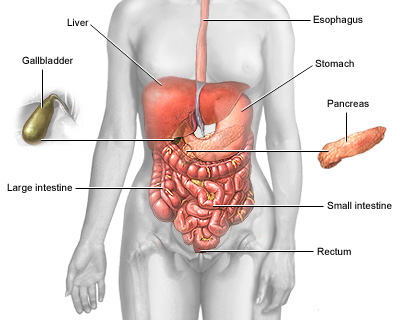Intestinal obstruction
Contents
When to Contact a Medical Professional
General Information
Intestinal obstruction is a partial or complete blockage of the bowel that prevents the contents of the intestine from passing through.

The esophagus, stomach, large and small intestine, aided by the liver, gallbladder and pancreas convert the nutritive components of food into energy and break down the non-nutritive components into waste to be excreted.
Causes
Obstruction of the bowel may due to:
- A mechanical cause, which means something is in the way
- Ileus, a condition in which the bowel doesn't work correctly but there is no structural problem
Paralytic ileus, also called pseudo-obstruction, is one of the major causes of intestinal obstruction in infants and children. Causes of paralytic ileus may include:
- Bacteria or viruses that cause intestinal infections (gastroenteritis)
- Chemical, electrolyte, or mineral imbalances (such as decreased potassium levels)
- Complications of abdominal surgery
- Decreased blood supply to the intestines (mesenteric ischemia)
- Infections inside the abdomen, such as appendicitis
- Kidney or lung disease
- Use of certain medications, especially narcotics
Mechanical causes of intestinal obstruction may include:
- Adhesions or scar tissue that forms after surgery
- Foreign bodies (eaten materials that block the intestines)
- Gallstones (rare)
- Hernias
- Impacted stool
- Intussusception (telescoping of one segment of bowel into another)
- Tumors blocking the intestines
- Volvulus (twisted intestine)
Symptoms
- Abdominal swelling (distention)
- Abdominal fullness, gas
- Abdominal pain and cramping
- Breath odor
- Constipation
- Diarrhea
- Inability to pass gas
- Vomiting
Exams and Tests
During a physical exam, the health care provider may find bloating, tenderness, or hernias in the abdomen.
Tests that show obstruction include:
- Abdominal CT scan
- Abdominal x-ray
- Barium enema
- Upper GI and small bowel series
Treatment
Treatment involves placing a tube through the nose into the stomach or intestine to help relieve abdominal swelling (distention) and vomiting. Volvulus of the large bowel may be treated by passing a tube into the rectum.
Surgery may be needed to relieve the obstruction if the tube does not relieve the symptoms, or if there are signs of tissue death.
Outlook (Prognosis)
The outcome depends on the cause of the blockage. Most of the time the cause is easily treated.
Possible Complications
Complications may include or may lead to:
- Electrolyte (blood chemical and mineral) imbalances
- Dehydration
- Hole (perforation) in the intestine
- Infection
- Jaundice (yellowing of the skin and eyes)
If the obstruction blocks the blood supply to the intestine, it may cause infection and tissue death (gangrene). Risks for tissue death are related to the cause of the blockage and how long it has been present. Hernias, volvulus, and intussusception carry a higher gangrene risk.
In a newborn, paralytic ileus that destroys the bowel wall (necrotizing enterocolitis) is life-threatening and may lead to blood and lung infections.
When to Contact a Medical Professional
Call your health care provider if you:
- Cannot pass stool or gas
- Have a swollen abdomen (distention) that does not go away
- Keep vomiting
Prevention
Prevention depends on the cause. Treating conditions, such as tumors and hernias, that can lead to obstruction may reduce your risk of getting an obstruction.
Some causes of obstruction cannot be prevented.
Source: http://www.nlm.nih.gov/medlineplus/ency/article/000260.htm

